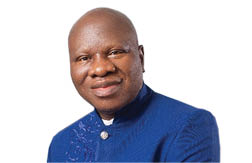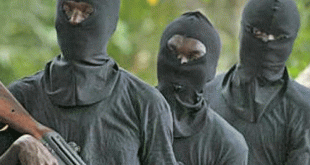President-General of the Igbaja Progressive Union, (IPU) of Ibaja Community, Ifelodun Local Government Area, Kwara State and CEO of Integrated Kitchen Company Limited, Pastor Oluwatoyin Alabi speaks with CHRISTIE DOYIN on his vision for the rebirth of Igbaja, detailing the collective efforts of Igbaja’s indigenes, as well as the preparation for Igbaja Day 2024 celebration.
In the past, Igbaja gained international recognition through Radio ELWA, ECWA Seminary, and similar institutions. However, the activities seem to have declined. What happened to them and what initiatives are you implementing to restore the town’s prominence?
Igbaja has not lost its glory in any way. I agree that in the past, Igbaja was well-known for Radio ELWA because it was broadcasted nationwide and even worldwide. The recordings were done in Igbaja, but the broadcasts were from Liberia. Those spiritual songs and hymns made ECWA and Igbaja town very popular. The seminary and the College of Education also contributed to the popularity of Igbaja as an educational hub in Kwara State. Additionally, Al-Hikma University has a campus in Igbaja, bringing it onto the global map of towns with University. Radio ELWA, which stands for Eternal Love Winning Africa, was a significant beacon of Christian broadcasting in the mid-20th century. The station played a crucial role in disseminating religious content, spiritual songs, and hymns that resonated with many people far and wide. This made Igbaja a focal point for spiritual nourishment and education. The ECWA Theological Seminary further solidified Igbaja’s reputation as an educational centre, attracting students from various regions who came to study theology and related disciplines. However, as time passed, the missionaries who founded these institutions eventually retired and returned to their home countries. This change in leadership led to a shift in how these institutions were managed. The decentralisation of power within the church administration meant that local branches had to take on more responsibilities. While this had its benefits, it also meant that some institutions could not maintain the same level of influence they once had. Despite these changes, Igbaja has continued to thrive in other ways. The establishment of Al-Hikma University’s campus in Igbaja brought new life to the town. This university has expanded the town’s educational offerings and placed Igbaja on the global map of towns with higher education institutions. Additionally, the College of Education and secondary schools in Igbaja have produced many influential individuals who have excelled in various sectors of the economy, both nationally and internationally. So, contrary to the belief that the popularity of Igbaja is declining, we have actually been moving from glory to glory. The missionaries who established Radio ELWA, ECWA Dispensary, and other institutions eventually retired and moved back, leading to an evolution in church administration. This decentralisation of power resulted in some churches managing their own affairs, which may have reduced their influence. Igbaja is a remarkable community with a rich history. It is one of the few communities in Kwara State dating back to the early 1900s. There are two schools of thought regarding its founders: either the Akusi from the Nupe side or people from Oyo. Regardless, Igbaja has evolved into a globally recognised community due to its universities, College of Education, and secondary schools, which have produced many influential individuals across various sectors of the economy.
Historically, Igbaja was at the forefront of social activities, especially during festive periods, attracting musicians and other notable figures. From what you’ve said, it seems that all societies, associations, and social clubs fall under the purview of the IPU. Why the lull?
The lull generally could be attributed to the state of the economy but especially because our generation has realised that rather than spend money on frivolities like spraying at parties or on irrelevants, we’ll rather build our community. Yes, the Igbaja Progressive Union (IPU) National Executive Council oversees various branches: IPU Ilorin Branch, IPU Lagos Branch, IPU Igbaja Branch, and each of these branches has its own executive in their respective towns. We also have clubs like IPF, Igbaja People’s Forum, Pathfinder, Ifesowopo, IMC, and ICAN, which are stakeholders in the IPU National Executive Council. These clubs are instrumental in fundraising efforts for our initiatives. The coordination of these various branches and clubs is crucial to our success. We hold regular meetings to ensure that everyone is on the same page and working towards our common goals. The IPU acts as an umbrella organisation that brings together all these groups, fostering collaboration and unity. Historically, Igbaja was known for its vibrant social scene, especially during festive periods. People from far and wide would come to Igbaja to partake in various celebrations, enjoy the music, and connect with friends and family. However, over the years, there has been a shift in priorities. Many people now prefer to invest their resources in community development projects rather than spending on social events. This shift has led to a reduction in the number of large-scale social activities, it has also resulted in significant progress in terms of infrastructure and services in Igbaja.
You seem to have a well-coordinated approach in overseeing various organisations. How do you manage this?
We ensure buy-in from leaders of the different organisations through a caucus where we share our ideas, which they then disseminate to their members. This collaborative approach ensures effective coordination. Also, we adopted a new approach to ensure broader participation and better outcomes. Despite facing resistance, I exercised my authority to appoint committee members, emphasising integrity and competence. We encouraged collaboration with stakeholders from various organisations, resulting in significant financial gains without resorting to traditional fundraising methods. Our aim is for all indigenes to contribute, ensuring a memorable and inclusive Igbaja Day celebration. However, I personally as the President-General, want Igbaja to be financially independent, without relying on constant donations. For instance, we planned a befitting six-storey edifice to be called Igbaja House to be built in Lagos. It is expected to house office accommodations, shops, an event centre, and possibly a shopping mall. If we raise N2.5 million each from four of the floors annually, that totals N10 million a year. This would cover expenses like the N3.6 million needed for vigilante services, road construction and rehabilitation, and continued provision of free health facilities among others in Igbaja without requiring additional community contributions. This is why we are working hard to make this year’s Igbaja Day different, with a target rising to N200 million.
How do you hope to achieve these?
Our strategy like I said involves getting buy-in from the leaders of these organisations. We have an all-caucus meeting where we present our programmes, and they, in turn, share these with their members. This way, we ensure everyone is aligned and engaged. I told you that the approach we’ve taken is inclusive and strategic. In addition to regular meetings, we also have a strong communication network that allows us to stay connected with all the branches and clubs. We use various channels, including social media, newsletters, and community forums, to keep everyone informed about our activities and progress. This transparency and open communication help build trust and ensure that everyone feels a part of the process.
Regarding security, considering recent infiltrations by bandits and kidnappers, how is the community addressing these challenges, especially following the influx of displaced persons from other states, including Igboho in Oyo state?
Security is a top priority for us. In recent years, we have seen an increase in security challenges across the country, including infiltrations by bandits and kidnappers. In anticipation of security threats and to address these threats, we took proactive steps to ensure the safety of our community. We established the Igbaja Security Network (ISN) under the leadership of a retired army major. This network works closely with the Oluode, who is the head of the hunters in Igbaja. The combination of military expertise and local knowledge has proven to be highly effective in keeping our community safe. Our security network operates round the clock, monitoring and responding to potential threats. We have also implemented a community watch programme where residents are encouraged to report any suspicious activities. This collaborative effort between the ISN and the community has helped us prevent any major security breaches. Furthermore, we have invested in modern security equipment and training for our personnel. This includes surveillance systems, communication devices, and regular training sessions to ensure that our security team is well-prepared to handle any situation. By staying vigilant and proactive, we have managed to maintain a high level of security in Igbaja.
It seems there’s yet a lot to be done. What is the community doing especially concerning incidents involving Fulani herders, kidnappers, and other bandits in neighbouring town connecting Igbaja. Can you provide a broader explanation?
Despite some security breaches in the last two years, none have affected Igbaja. We have taken proactive steps to secure our community. Like I said earlier, we established the Igbaja Security Network (ISN) under the command of a retired army major and involved the Oluode that is the head of the hunters of Igbaja. We anticipated potential threats after the ejection of some Fulani people from Igboho in Oyo State and we planned ahead, ensuring our community remains secure. The key to our security strategy has been a combination of proactive measures and community involvement. The establishment of the ISN was a critical step in this direction. By having a retired army major lead the network, we benefit from his extensive experience and strategic thinking. The involvement of the Oluode and the hunters adds a layer of local expertise and familiarity with the terrain, which is crucial in preventing and responding to threats. We also recognised the importance of intelligence gathering and surveillance to monitor activities in and around Igbaja. This includes the use of drones, surveillance cameras, and other communication devices that help us stay ahead of potential threats. The integration of traditional methods with modern technology has been key to our success. In addition to these measures, we have worked to foster a sense of vigilance and responsibility within the community. We have established a system where residents can report suspicious activities through a hotline or directly to security personnel. This collective effort has helped us maintain a secure environment, as everyone is on the lookout and ready to act if need be.
Why is this year’s Igbaja Day different?
A wise man once said, “If you keep doing the same thing the same way and expect different results, it’s called insanity.” We wanted better results, so we changed our approach. This new strategy initially met resistance, even from my own executive members. Some argued against the changes, some wanted the vice president of IPUNEC to chair the committee but I stood firm. As I said earlier, exercised my authority to appoint committee members, emphasising integrity and competence. We encouraged collaboration with stakeholders from various organisations, resulting in significant financial gains without resorting to traditional fundraising methods. I selected individuals with integrity who could inspire others to join our development agenda. I appointed the former president of IPF, Dr. Rasaq Ogunleye to head the committee and gave him the freedom to choose his team. Our goal is for all indigenes to contribute in advance, allowing us to focus on our guests’ support on the actual day. We adopted a new approach to ensure broader participation and better outcomes. Despite facing resistance, I exercised my authority and also gave R. Ogunleye to appoint those he can successfully work with in the committee, emphasising integrity and competence. Our aim is for all indigenes to contribute ahead, ensuring a memorable and inclusive Igbaja Day celebration. This year, we have also set a very ambitious target. We are aiming to raise N200 million as I told you, which will be used to fund various developmental projects in Igbaja. These projects include infrastructure development, healthcare services, educational initiatives, and security enhancements. By focusing on these areas, we aim to create a sustainable and thriving community.
Are you close to achieving this target?
It will happen, don’t worry.
You have provided a comprehensive background. But we are curious about how the IPU manages to oversee all these other bodies, clubs, and societies. How does your role as President-General fit into this broader landscape?
Our strategy as stated earlier involves getting buy-in from the leaders of these organizations. We have an all-caucus meeting where we present our programmes, and they, in turn, share these with their members. This way, we ensure everyone is aligned and engaged. The role of the President-General is to act as a unifying figure and a catalyst for change. It involves coordinating efforts, mediating in disputes, and ensuring that all stakeholders are working towards the common goal of developing Igbaja. My role also involves setting strategic directions, identifying key projects, and mobilising resources to achieve our objectives. The key to successful management lies in our ability to build consensus and foster collaboration. We achieve this through regular communication, transparency in our dealings, and a shared vision for the future of Igbaja. By ensuring that everyone is on the same page, we can effectively pool our resources and talents to achieve our goals. Go round and see all the various development works done in Igbaja. Many are still being done and we are forging ahead.
 National Telescope national telescope newspaper
National Telescope national telescope newspaper




